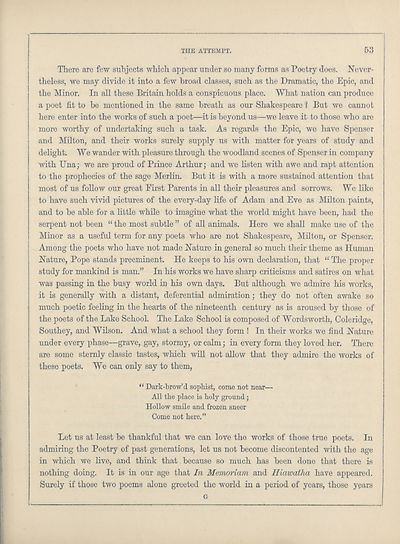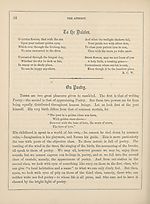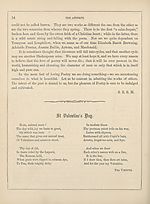Attempt > Volume 1 and Select writings
(351) Page 53
Download files
Complete book:
Individual page:
Thumbnail gallery: Grid view | List view

THE ATTEMPT.
53
There are few subjects which appear under so many forms as Poetry does. Never¬
theless, we may divide it into a few broad classes, such as the Dramatic, the Epic, and
the Minor. In all these Britain holds a conspicuous place. What nation can produce
a poet fit to he mentioned in the same breath as our Shakespeare 1 But we cannot
here enter into the works of such a poet—it is beyond us—we leave it to those who are
more worthy of undertaking such a task. As regards the Epic, we have Spenser
and Milton, and their works surely supply us with matter for years of study and
delight. We wander with pleasure through the woodland scenes of Spenser in company
with Una; we are proud of Prince Arthur; and we listen with awe and rapt attention
to the prophecies of the sage Merlin. But it is with a more sustained attention that
most of us follow our great First Parents in all their pleasures and sorrows. We like
to have such vivid pictures of the every-day life of Adam and Eve as Milton paints,
and to he able for a little while to imagine what the world might have been, had the
serpent not been “ the most subtle ” of all animals. Here we shall make use of the
Minor as a useful term for any poets who are not Shakespeare, Milton, or Spenser.
Among the poets who have not made Nature in general so much their theme as Human
Nature, Pope stands preeminent. He keeps to his own declaration, that “ The proper
study for mankind is man.” In his works we have sharp criticisms and satires on what
was passing in the busy world in his own days. But although we admire his works,
it is generally with a distant, deferential admiration; they do not often awake so
much poetic feeling in the hearts of the nineteenth century as is aroused by those of
the poets of the Lake School. The Lake School is composed of Wordsworth, Coleridge,
Southey, and Wilson. And what a school they form ! In their works we find Nature
under every phase—grave, gay, stormy, or calm; in every form they loved her. There
are some sternly classic tastes, which will not allow that they admire the works of
these poets. We can only say to them,
“ Dark-brow’d sophist, come not near—
All the place is holy ground;
Hollow smile and frozen sneer
Come not here.”
Let us at least be thankful that we can love the works of those true poets. In
admiring the Poetry of past generations, let us not become discontented with the age
in which we live, and think that because so much has been done that there is
nothing doing. It is in our age that In Memoriam and Hiawatha have appeared.
Surely if those two poems alone greeted the world in a period of years, those years
G
53
There are few subjects which appear under so many forms as Poetry does. Never¬
theless, we may divide it into a few broad classes, such as the Dramatic, the Epic, and
the Minor. In all these Britain holds a conspicuous place. What nation can produce
a poet fit to he mentioned in the same breath as our Shakespeare 1 But we cannot
here enter into the works of such a poet—it is beyond us—we leave it to those who are
more worthy of undertaking such a task. As regards the Epic, we have Spenser
and Milton, and their works surely supply us with matter for years of study and
delight. We wander with pleasure through the woodland scenes of Spenser in company
with Una; we are proud of Prince Arthur; and we listen with awe and rapt attention
to the prophecies of the sage Merlin. But it is with a more sustained attention that
most of us follow our great First Parents in all their pleasures and sorrows. We like
to have such vivid pictures of the every-day life of Adam and Eve as Milton paints,
and to he able for a little while to imagine what the world might have been, had the
serpent not been “ the most subtle ” of all animals. Here we shall make use of the
Minor as a useful term for any poets who are not Shakespeare, Milton, or Spenser.
Among the poets who have not made Nature in general so much their theme as Human
Nature, Pope stands preeminent. He keeps to his own declaration, that “ The proper
study for mankind is man.” In his works we have sharp criticisms and satires on what
was passing in the busy world in his own days. But although we admire his works,
it is generally with a distant, deferential admiration; they do not often awake so
much poetic feeling in the hearts of the nineteenth century as is aroused by those of
the poets of the Lake School. The Lake School is composed of Wordsworth, Coleridge,
Southey, and Wilson. And what a school they form ! In their works we find Nature
under every phase—grave, gay, stormy, or calm; in every form they loved her. There
are some sternly classic tastes, which will not allow that they admire the works of
these poets. We can only say to them,
“ Dark-brow’d sophist, come not near—
All the place is holy ground;
Hollow smile and frozen sneer
Come not here.”
Let us at least be thankful that we can love the works of those true poets. In
admiring the Poetry of past generations, let us not become discontented with the age
in which we live, and think that because so much has been done that there is
nothing doing. It is in our age that In Memoriam and Hiawatha have appeared.
Surely if those two poems alone greeted the world in a period of years, those years
G
Set display mode to: Large image | Transcription
Images and transcriptions on this page, including medium image downloads, may be used under the Creative Commons Attribution 4.0 International Licence unless otherwise stated. ![]()
| Ladies' Edinburgh Debating Society publications > Attempt > Volume 1 and Select writings > (351) Page 53 |
|---|
| Permanent URL | https://digital.nls.uk/109869166 |
|---|
| Attribution and copyright: |
|
|---|

